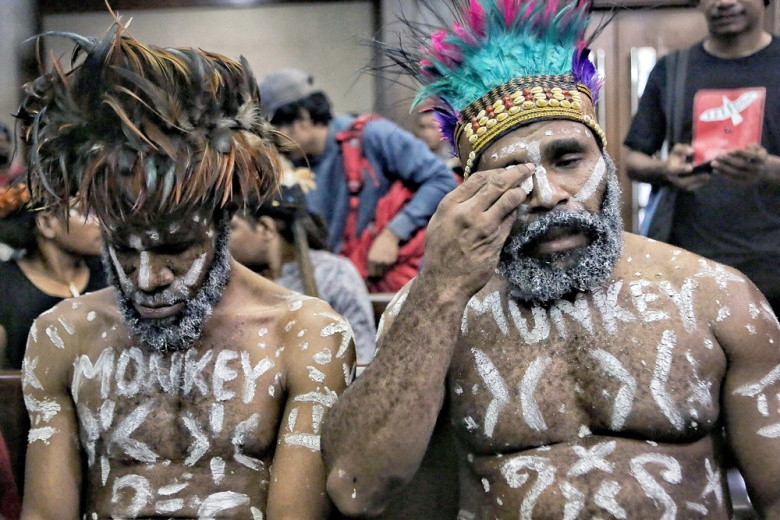
Indonesia's unconscionable prisoner policy
by Usman Hamid and Veronica KomanThe United Nations is right: It’s impossible to practice physical distancing and self-isolation in an overcrowded prison. We therefore applaud the decision by Law and Human Rights Minister Yasonna Laoly to release almost 40,000 prisoners at risk from the COVID-19 pandemic.
As this devastating virus sweeps across the globe, prisons are at risk of becoming a very dangerous hotspot for COVID-19 outbreaks. Minister Yasonna’s policy however falls crucially short: Prisoners of conscience are excluded from the policy, despite the UN urging that “political prisoners should be among the first released”.
It is more important than ever that states take urgent measures to protect all those who are deprived of their liberty, especially by releasing all individuals who are held simply for peacefully exercising their rights.
President Joko “Jokowi” Widodo’s government has detained 69 prisoners of conscience (PoCs) on treason charges, a record in recent times for Indonesia. The majority of them, 54, are indigenous Papuans. Five of the PoCs will be released Tuesday after completing their jail terms.
One Indonesian of Batak ethnicity, Paulus Suryanta Ginting, is the first non-indigenous West Papuan to be charged with treason over the self-determination cause. Meanwhile, a Polish man, Jakub Skrzypski, is the first foreign national to be charged with treason under Indonesian law and has been recognized by the European Parliament as a political prisoner. His “crime” was having met with pro-independence Papuan activists while traveling. The 12 other PoCs are from Maluku.
All are peaceful activists who have been detained for political expression -- simply carrying flags, or organizing or participating in peaceful protests, or being members of political organizations. Eleven of them have been sentenced, 15 are on trial, and 40 others are awaiting trial. No one should ever be arrested or detained solely for exercising their human rights.
The majority of these PoCs, 54 people, were arrested during and in the immediate wake of the 2019 West Papua uprising that took place from Aug. 19 to Sept. 23 last year. These protests against racism and for self-determination, likened to an “earthquake” of anger and hope, took place in towns and villages throughout Papua. Demonstrations of solidarity broke out in cites all over Indonesia too, and garnered international attention for the Papuan situation.
Jakarta’s response was a crackdown so brutal that the UN human rights office issued not one but two statements of concern. Authorities made a series of mass arrests ahead of further protests on the Dec 1, 2019, when Papuans commemorate their national day.
By the end of the uprising, more than 10,000 extra police and military had been deployed to Papua. Armed paramilitary police patrolled universities and residential areas. No further public gatherings were allowed in the province. Self-determination protests have since abated, because almost all student leaders and key leaders of Papua’s civil movement were either detained or forced into hiding.
There are at least seven prominent PoCs currently on trial in Balikpapan, East Kalimantan. Two of them, Buchtar Tabuni and Stevanus Itlay, are imprisoned for their political activities for the third time. On Oct. 4 last year, they were transferred, in breach of criminal procedures law and without prior notice to their lawyers and families, from Papua to Kalimantan for “security reasons”. The defendants have been questioned in court as to who had shouted “Free West Papua” slogans and who had brought Morning Star flags to the protests. Their hearings, held online as the pandemic rages, showed they are on trial for expressing their political beliefs.
On May 11, the four PoCs in Jakarta were almost released by prison authorities implementing the COVID-19 safety policy, as more than two-thirds of their sentences had been served. All four had signed release letters confirming their assimilation, had tested negative for COVID-19 and were holding a package of rice and instant noodles to take home. As they awaited the door to freedom, a prison staffer arrived and apologized; a political decision had come from above canceling their release.
One can only imagine the mental anguish not only for the prisoners but also their families, arising from this cruel move by the Indonesian government to quash their release.
The PoCs are detained in different prisons and detention centers. Conditions vary, but they are all characterized by overcrowding, poor sanitation and extremely limited healthcare services. The government has been criticized for its COVID-19 handling.
Prisoners of conscience have not committed any crime and yet they continue to be arbitrarily detained, in conditions that are now becoming increasingly dangerous.
As a sitting member of the UN Human Rights Council, Indonesia needs to respect international human rights law by releasing these prisoners of conscience immediately and unconditionally.
***
Usman Hamid is the director of Amnesty International Indonesia. Veronica Koman is a human rights lawyer representing 63 prisoners of conscience under the UN special procedures.
Disclaimer: The opinions expressed in this article are those of the author and do not reflect the official stance of The Jakarta Post.